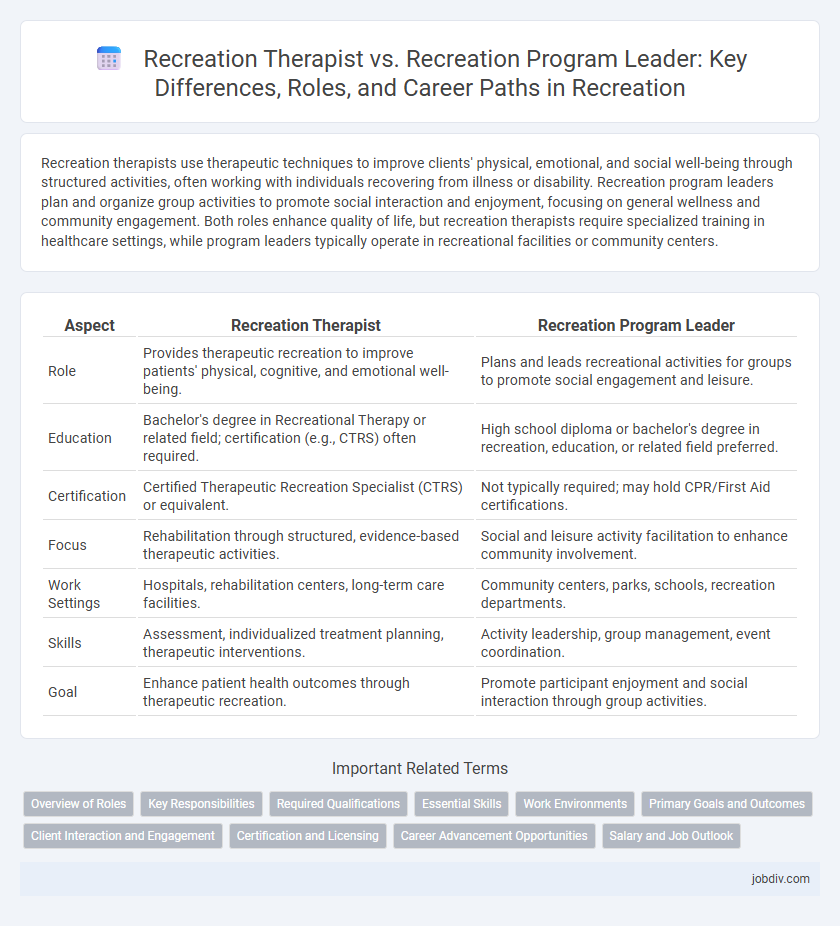Recreation therapists use therapeutic techniques to improve clients' physical, emotional, and social well-being through structured activities, often working with individuals recovering from illness or disability. Recreation program leaders plan and organize group activities to promote social interaction and enjoyment, focusing on general wellness and community engagement. Both roles enhance quality of life, but recreation therapists require specialized training in healthcare settings, while program leaders typically operate in recreational facilities or community centers.
Table of Comparison
| Aspect | Recreation Therapist | Recreation Program Leader |
|---|---|---|
| Role | Provides therapeutic recreation to improve patients' physical, cognitive, and emotional well-being. | Plans and leads recreational activities for groups to promote social engagement and leisure. |
| Education | Bachelor's degree in Recreational Therapy or related field; certification (e.g., CTRS) often required. | High school diploma or bachelor's degree in recreation, education, or related field preferred. |
| Certification | Certified Therapeutic Recreation Specialist (CTRS) or equivalent. | Not typically required; may hold CPR/First Aid certifications. |
| Focus | Rehabilitation through structured, evidence-based therapeutic activities. | Social and leisure activity facilitation to enhance community involvement. |
| Work Settings | Hospitals, rehabilitation centers, long-term care facilities. | Community centers, parks, schools, recreation departments. |
| Skills | Assessment, individualized treatment planning, therapeutic interventions. | Activity leadership, group management, event coordination. |
| Goal | Enhance patient health outcomes through therapeutic recreation. | Promote participant enjoyment and social interaction through group activities. |
Overview of Roles
Recreation Therapists use therapeutic techniques to improve patients' physical, emotional, and social well-being, often working in healthcare settings such as hospitals and rehabilitation centers. Recreation Program Leaders organize and facilitate recreational activities for community groups, focusing on promoting social interaction, leisure skills, and overall community engagement. Both roles aim to enhance quality of life, but therapists focus on individualized treatment plans while program leaders emphasize group activity coordination.
Key Responsibilities
Recreation Therapists develop individualized treatment plans to improve patients' physical, emotional, and social well-being through therapeutic activities, often collaborating with healthcare professionals. Recreation Program Leaders organize, lead, and evaluate recreational activities and events for groups, ensuring participant engagement and safety in community or recreational settings. Both roles require strong interpersonal skills, but therapists focus on clinical outcomes while program leaders emphasize program coordination and participant satisfaction.
Required Qualifications
Recreation therapists typically require a bachelor's degree in therapeutic recreation or a related field, along with certification such as the Certified Therapeutic Recreation Specialist (CTRS) credential to design and implement treatment plans for individuals with disabilities or illnesses. Recreation program leaders generally need a high school diploma or associate degree, with experience in organizing and supervising recreational activities, but certification in first aid and CPR is often mandatory. Both roles demand strong interpersonal skills, but recreation therapists must have specialized training in therapeutic techniques to address clients' physical, emotional, and social needs effectively.
Essential Skills
Recreation Therapists possess specialized knowledge in therapeutic techniques, patient assessment, and individualized treatment planning, enabling them to design programs that promote physical and emotional recovery. Recreation Program Leaders excel in leadership, event coordination, and group facilitation, focusing on organizing recreational activities that engage diverse community groups. Both roles require strong communication, problem-solving, and interpersonal skills to effectively motivate participants and foster a supportive environment.
Work Environments
Recreation Therapists primarily work in healthcare settings such as hospitals, rehabilitation centers, and nursing homes, focusing on therapeutic interventions to improve patients' physical and emotional well-being. Recreation Program Leaders are typically employed in community centers, parks, schools, and recreational facilities where they organize and lead group activities aimed at leisure and social engagement. Both roles require adaptability to diverse environments, but therapists prioritize clinical settings while program leaders focus on community-based recreational opportunities.
Primary Goals and Outcomes
Recreation Therapists focus on improving clients' physical, emotional, and cognitive health by developing personalized therapeutic recreational activities tailored to individual needs. Recreation Program Leaders aim to organize and facilitate group activities that promote social interaction, community engagement, and overall well-being within diverse populations. Both roles enhance quality of life, but therapists emphasize clinical outcomes while program leaders prioritize recreation access and participation.
Client Interaction and Engagement
Recreation Therapists use therapeutic techniques to improve clients' physical and emotional well-being through tailored activities, emphasizing individualized care and client progress monitoring. Recreation Program Leaders facilitate group recreational activities, focusing on fostering social interaction and community engagement among participants. Both roles prioritize enhancing client participation but differ in clinical involvement and personalized treatment planning.
Certification and Licensing
Recreation Therapists typically require certification from the National Council for Therapeutic Recreation Certification (NCTRC) and often need state licensure to practice clinically with patients. Recreation Program Leaders usually hold certifications such as Certified Park and Recreation Professional (CPRP) or other specialized credentials but generally do not require licensing. Certification for both roles enhances professional credibility, but licensing is mandatory primarily for Recreation Therapists due to the clinical nature of their work.
Career Advancement Opportunities
Recreation therapists often experience greater career advancement opportunities through certification programs and specialized training in therapeutic recreation, enabling roles in clinical or healthcare settings. Recreation program leaders typically advance by gaining experience in program development and management, leading to positions such as director of recreation services or community recreation manager. Both roles benefit from strong leadership skills, but recreation therapists have unique pathways toward roles in rehabilitation centers and hospitals.
Salary and Job Outlook
Recreation Therapists earn an average salary of $48,000 to $60,000 annually, with employment growth projected at 14% through 2031 due to increasing demand for therapeutic recreational services. Recreation Program Leaders typically make between $30,000 and $45,000 per year, and job outlook remains steady with moderate growth in community and recreational facilities. Salary differences reflect the specialized training and certification required for Recreation Therapists, contributing to stronger demand and higher compensation in healthcare and rehabilitation settings.
Recreation Therapist vs Recreation Program Leader Infographic

 jobdiv.com
jobdiv.com